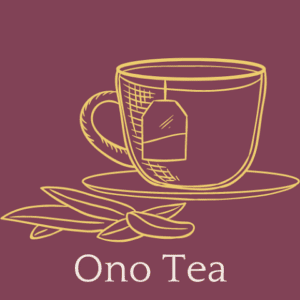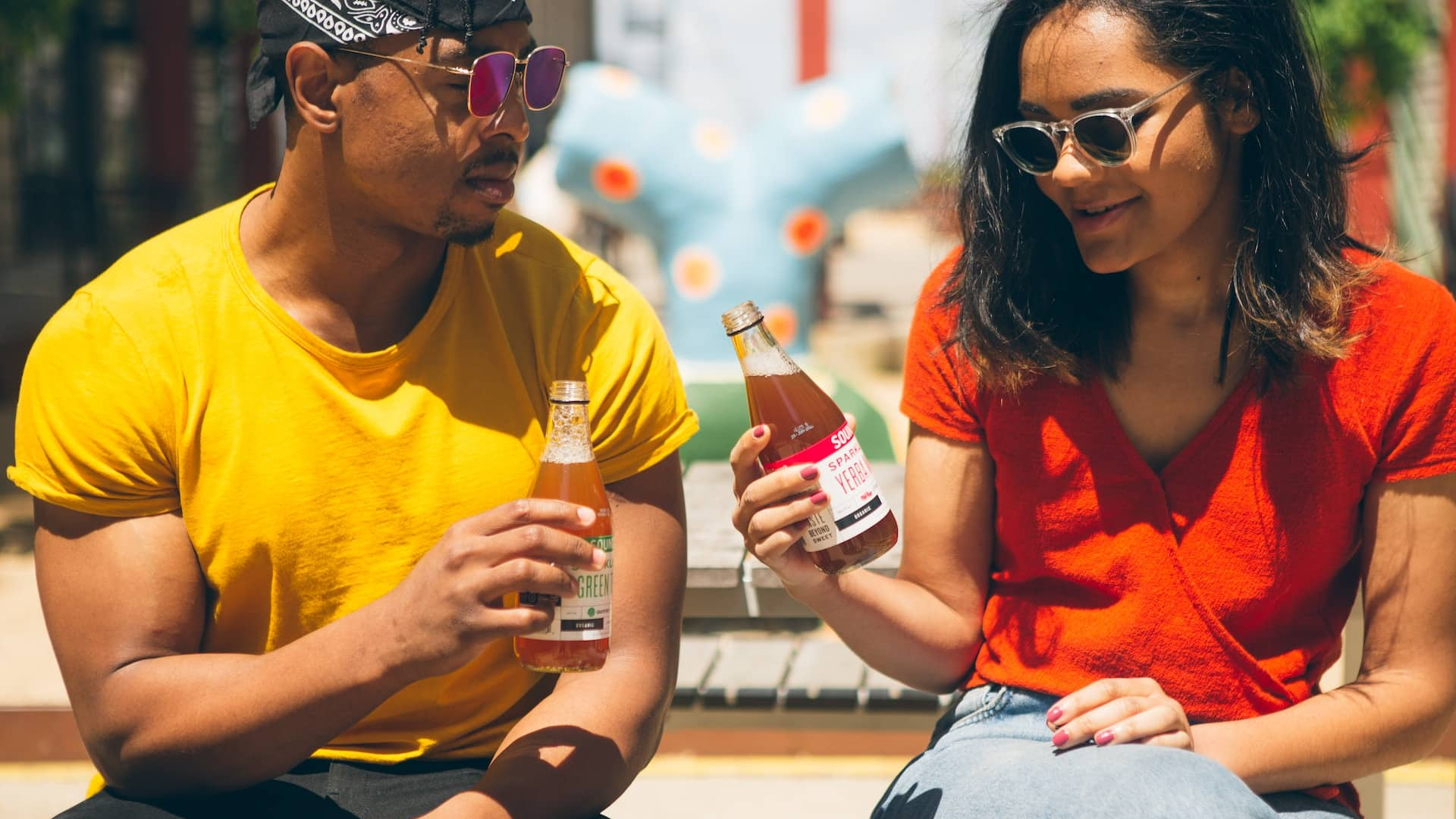Popular in the US, sweet tea, better known as a sugary tea, is a Southern sweet tea that has replaced soft drinks and energy drinks. It is the same as iced tea, but the difference is in the temperature of the tea. Whether hot or cold, these teas do contain caffeine.
Cutting it short, yes, iced tea or sweet tea does contain caffeine. A typical sweet tea is made using well-known black tea leaves that have a high caffeine concentration. However, the caffeine content found in sweet tea varies from that of coffee.
You might consider decaffeinated tea as a better alternative, but somehow, there does not exist tea without caffeine. So the real question is: how much caffeine is good for you, and which sweet tea must you choose?
Is There Caffeine in Sweet Tea?
The top two brands of sweet tea in the USA are Lipton and McDonald’s. Now, can sweet tea from these two brands have the same caffeine content? Well, it is a hard yes and an easy no. Because if you brew Lipton Southern Tea (known for its low caffeine content) for more time, the caffeine content will rise. Similarly, changing the amount of sugar put in tea can also affect the caffeine level.
One thing you must keep in mind is that the tea leaves have an impact on the amount of caffeine in your drink. For example, McDonald’s Sweet Tea has a high caffeine concentration compared to Lipton Southern Sweet Tea. Similarly, home-brewed sweet tea will have different caffeine content.
The fun part is that the caffeine content in sweet tea is not even close to the caffeine concentration in coffee. This somehow makes drinking tea a better option. For example, if you are drinking an 8-oz cup of sweet tea, your tea is likely to have a caffeine concentration of around 14 mg.
This, however, does not apply to all types of tea. The method you use and the leaves you pick for your sweet tea can significantly impact the concentration of caffeine in sweet tea.
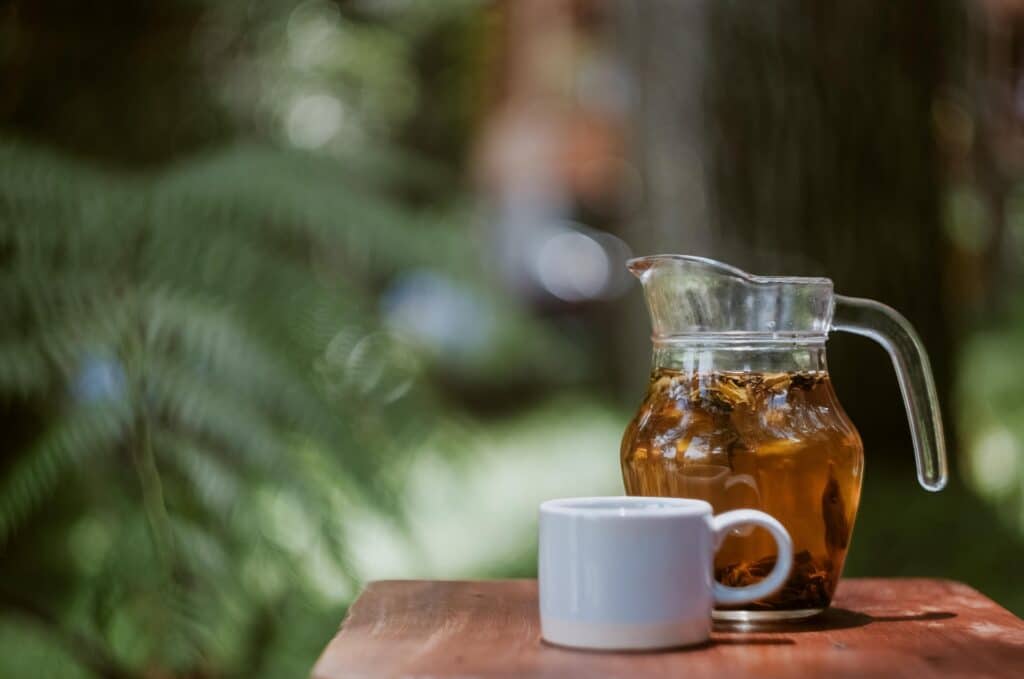
Sweet Tea Benefits
If you want to enjoy sweet tea without thinking much about its caffeine content, it is better to do so with the help of remembering its benefits. The best benefit of sweet tea is that it keeps you hydrated. So if you can’t drink water alone, sweet tea helps you reach your daily target.
Secondly, sweet tea has the effect of being an antioxidant. Antioxidants help boost the immune system by fighting off free radicals and promoting better gut health. The levels of polyphenol antioxidants found in tea can be 8-10 times more than the amount found in fruits and veggies. But eventually, sweet tea is not an alternative to medicines, and do not expect it to act like one.
Many people ask if sweet tea can help with heart issues. The consumption of green tea can lower blood pressure, but it cannot treat heart diseases. Moreover, it reduces the person’s risk of heart attacks and reduces LDL cholesterol levels.
On the other hand, if you look at the Southern sweet tea recipe, you will find it has high sugar content. Hence, overconsumption of sweet tea can lead you to develop elevated blood sugar levels. Since every product has pros and cons, the same is true with sweet tea.
Coffee Beans vs Tea Leaves
The real source of caffeine is raw products. Since coffee is made using coffee beans and sweet tea is made using different types of tea leaves, we thought of comparing the two and getting a solid answer.
In the case of coffee beans, take one bean, and there is a 90% chance that it will contain around 6 mg of caffeine. In the case of tea leaves, it is hard to tell how much caffeine each leaf carries. Why? Because factors like brewing and sugar can impact its final caffeine concentration.
Moreover, the flavor you select for your sweet tea can also change the caffeine content. But if you want to compare coffee and sweet tea, it is better to compare brewed coffee and brewed tea.
Take a cup of freshly brewed coffee (8 ounces at most). This cup of coffee contains approximately 95 mg of caffeine. However, the same concentration of sweet tea will have around 27 mg of caffeine. If you put sugar in both drinks, the caffeine content will move a bit. There are several reasons for it, but molecular solubility is still at the top.
For easy understanding, let us say that coffee goes through new bonds with different molecules, resulting in lesser or higher caffeine content.
How Long Should You Brew Sweet Tea
Brewing sweet tea can do two things: first, it can increase or decrease the caffeine content. Second, it allows the tea to rest in your fridge for 3–4 days.
If you consider the second factor, we can say that brewing wins. However, the first factor is a bit complex. So allow us to put it straight. Making sweet tea or brewing it for long periods can increase the concentration of caffeine in it.
Similarly, brewing at the perfect time can keep the caffeine concentration under control. But let us not forget the fact that various types of tea leaves require different brewing times. You cannot brew black tea leaves at the same time as peach tea leaves.
Steep Time for Different Tea Leaves
Tea can become bitter when over brewed, so here is a breakdown of tea steeping times.
- Green tea should only be steeped for a maximum of two minutes.
- Black tea, on the other hand, can be brewed for 3-5 minutes.
- White and Oolong tea is best brewed for 2-3 minutes.
- If you want the best out of your Herbal and Rooibos tea, you can brew it for more than five minutes.
You can somehow control the caffeine levels of sweet teas, but you cannot do it without changing the taste of the tea. Now, what does this statement mean? To reduce the caffeine level of sweet tea, you need to brew it for a short time. Brewing it for a short time will not only reduce its lifespan but will also change the taste of the tea.
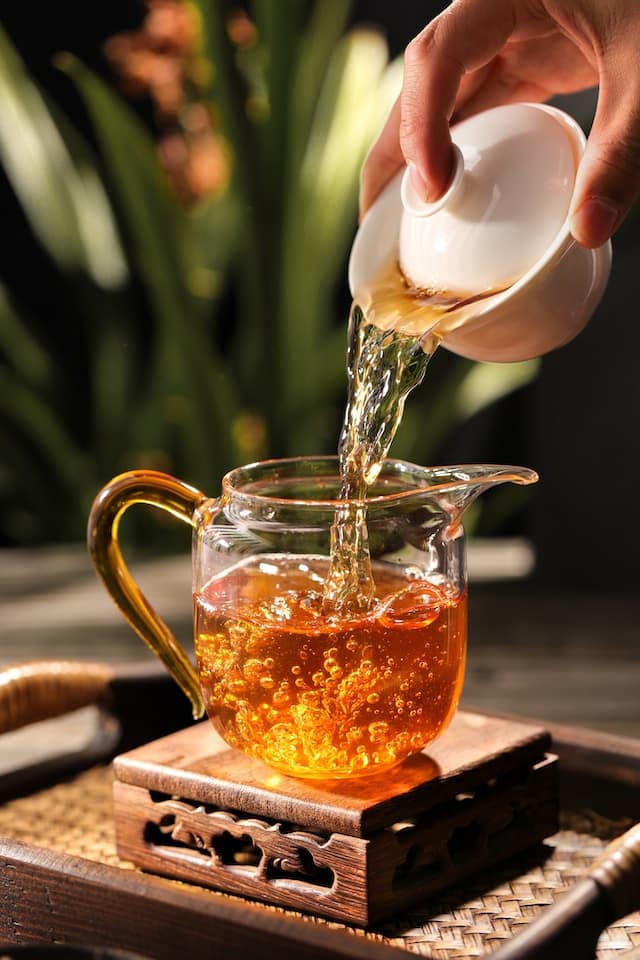
How to Reduce Caffeine Content in Sweet Tea
- Utilize decaffeinated leaves: Using decaffeinated tea leaves is one of the simplest methods to lessen the amount of caffeine in sweet tea. These have undergone special processing to eliminate the majority of the caffeine.
- Utilize lesser tea leaves: Using fewer tea leaves when making sweet tea can also lower the total amount of caffeine in the beverage.
- Lessen the Brewing Time: Reduce the amount of time you let the tea steep because the longer the tea is steeped, the more caffeine is released. You can lessen the caffeine content of the finished beverage by brewing the sweet tea for a shorter period.
- Use cold water: Brewing the sweet tea in cooler water will result in less caffeine being released into the finished beverage.
- Blend in other herbs: To lessen the total caffeine content of the beverage, try blending mint as well as lemon verbena with sweet tea.
- Add more water to sweet tea to dilute: Adding more water to sweet tea can also aid lower the amount of caffeine in the beverage.
Check out: Does Gold Peak Tea Have Caffeine?
Are Decaffeinated Teas a Real Thing?
Sweet tea with the majority of the caffeine eliminated is known as decaffeinated sweet tea. This can be done in a number of ways, such as by using decaffeinated tea leaves, taking the caffeine out of the tea leaves with a decaffeination process, or mixing decaffeinated and regular tea leaves to lower the total amount of caffeine.
Decaffeinated tea leaves have no impact on their flavor. Hence, you can say that decaffeinated sweet tea tastes similar to the usual sweet tea. The taste of regular and decaffeinated sweet tea may differ slightly for some individuals.
However, take note that since the caffeine content in decaffeinated sweet tea is lowered, the effects will be less stimulating compared to traditional sweet tea. This might be useful for people who are caffeine sensitive or have medical conditions that caffeine intake exacerbates.
The outcome of decaffeinated sweet teas differs based on the decaffeination process, manufacturer, and type of leaves used. Therefore, not all decaffeinated sweet teas are created equal. As a result, it is better to experiment with various decaffeinated sweet teas to discover one that benefits you the most.
If you like the taste of sweet tea but don’t like the way caffeine makes you feel, decaffeinated sweet tea can be a good alternative.
Check out: Does Raspberry Tea Have Caffeine?
Caffeine Levels on Different Types of Sweet Teas
- The most popular kind of tea leaves used to make sweet tea is black tea, which usually has 14 milligrams (mg) of caffeine for every 8 oz portion.
- Green tea leaves do have caffeine; an 8 oz dose typically has about 8 mg of caffeine, which is less than black tea leaves.
- Oolong tea seems to be a semi-oxidized tea with an estimated caffeine content of 12 mg per 8 oz dose.
- White tea leaves 8 oz portion typically has 6 mg of caffeine.
Good Effects of Caffeine from Sweet Tea
- Improved Energy and Mental Clarity: Because caffeine can help with both, sweet tea can be an effective choice among individuals who need a little pick-me-up throughout the day.
- Physical Health: You can increase strength and stamina by drinking caffeinated drinks. This results in an increased adrenaline release, which can enhance physical performance.
- Enhanced Mood: By altering the amounts of specific neurotransmitters found in the brain, like serotonin and dopamine, caffeine can assist in elevating mood.
- Improved Cardiovascular Health: According to some reports
, drinking sweet tea daily may contribute to better cardiovascular health by lowering the risk of coronary artery disease.
- Greater Diuresis: Seeing as caffeine is indeed a diuretic, it can make you pee more frequently and boost the quantity of urine produced.
What Happens If You Drink Too Much Sweet Tea
Consuming too much sweet tea can lead to a fast heart rate, high blood pressure, and restlessness, as well as jitteriness, anxiety, trouble sleeping, and an irregular heartbeat. Sweet tea and other sugary beverages are among the main causes of health issues like excess fat, asthma, and other conditions.
You may feel signs like faster breathing, trembling in your musculature, migraines, tension, depression, and insomnia if you ingest too much caffeine. Due to its caffeine content, drinking excessive amounts of tea can damage your liver and cause kidney stones.
Difference Between Sweet Tea and Iced Tea (In Terms of Caffeine Content)
While sweet and iced teas are prepared with tea leaves, sweet tea is typically manufactured with black tea leaves. This drink is sweetened with sugar, whereas iced tea can sometimes be made with a variety of tea leaves, including black, white, and oolong leaves, and can be either sweetened or left unsweetened. The caffeine content can change depending on the tea leaves used and the length of brewing.
The average amount of caffeine in an 8-oz portion of black tea-based sweet tea is around 14 mg, and the same is true for an 8-oz serving of black tea-based iced tea. The caffeine content of various brands and varieties of sweet and iced tea can range from low to high. A few might possess more or less caffeine than the average person consumes.
Decaffeinated tea leaves, which are also precisely prepared to remove the caffeine portion, can also be used to make iced tea. However, cold tea will have very little stimulant in this scenario.
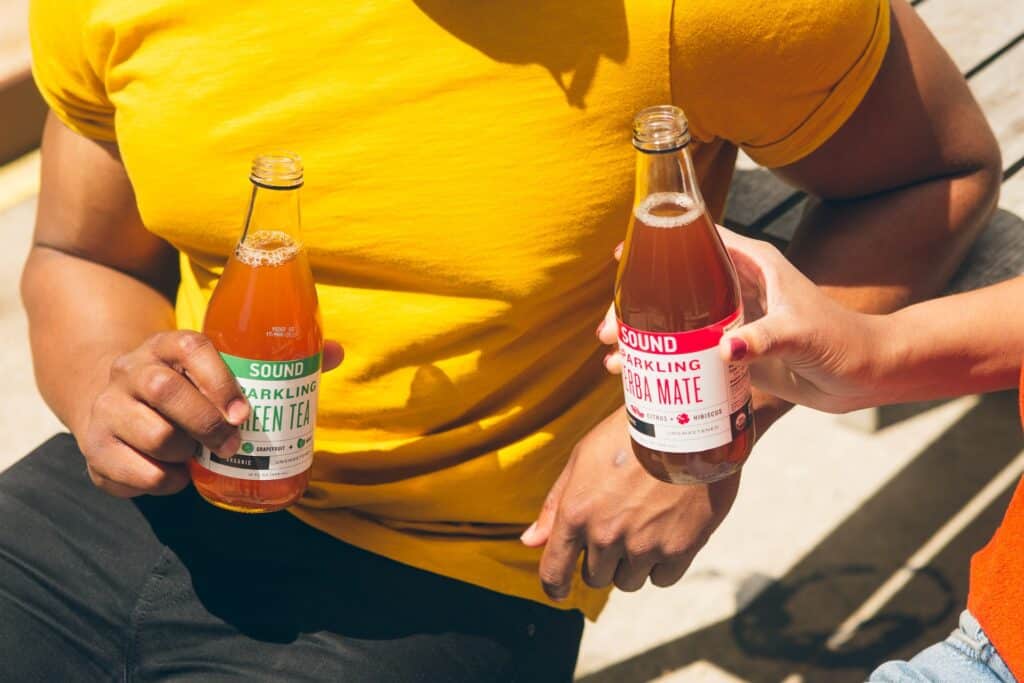
Southern Sweet Tea Recipe
Drinks like lemonade, strawberry, and the go-to limeade mix are all excellent choices. However, nothing compares to a delicious cup of Southern sweet tea.
What You Will Need
- Tea bags/leaves
- Baking soda (your choice)
- Sugar
- Water
- Pitcher
- Mason jars or other containers for storage
Procedure
- In a large saucepan or tea kettle placed above medium-high heat, bring 1 liter of water to a simmer.
- Drop the tea leaves into the water after turning off the heat. You should give fifteen minutes for the tea leaves to steep.
- Add your sugar to your kettle as your beverage is steeping.
- Before discarding the tea bags/leaves, remove them from the pot or kettle and press them against the edge to push as much of the tea as you can.
- Slowly pour 50% of the tea into another container. Stirring will help the sugar to dissolve as you pour a little of the remaining tea into the pitcher.
- Now add the baking powder and mix it perfectly.
- Take a Mason jar and pour some tea into it. Close the Mason jar’s top tightly and keep it there for a maximum of two weeks.
Sweet Tea Facts
Due to its year-round availability in both hot and cold forms, tea is topping the list. It is one of the most commonly consumed beverages in the world, second only to water. Take into account the fact that it can be found in almost 80% of US homes! Well, over 150 million Americans consume tea regularly.
• The Popularity of Sweet Tea in the US
Sweet tea is very popular in the South. In just 2021, Americans drank more than 85 billion servings, or more than 3.9 billion liters, of iced tea. According to studies by the Tea Association of the United States of America, black tea comprised 84% of all tea consumption, while green tea comprised 15%.
It’s important to keep in mind that sweet and iced teas are frequently regarded as equals. So the information above also applies to sweet tea.
• Iced/Sweet Tea Day in America
On June 10, Americans celebrate Iced and Sweet Tea Day. You do not have to wait until that day to savor this Southern institution. You can enjoy this day by making your favorite tea recipe.
Making sweet tea is a straightforward procedure, but it’s best to make it in advance so it can cool. A traditional sweet tea recipe requires two liters of boiling water and two teaspoons of green tea.
When it is time to serve, filter the tea into the serving cups over the ice and sugar. You only need two teaspoons of sugar per glass, but you can change the quantities to suit your tastes. For best results, squeeze some lemon over the top.
• Reducing Death Rate
A recent study found that those who consumed two or more cups of sweet tea daily had a 9%–13% lower risk of passing away from any cardiovascular condition than those who did not. According to the research, a balanced and healthy diet can include a daily intake of black tea.
Conclusion
If you want healthier sweet tea, make a brew of herbal tea yourself. Avoid drinking too many commercial iced teas, such as McDonald’s Sweet Tea. High-sugar and caffeine-rich sweet teas often lead to health issues later on.
Caffeine helps with energy and physical health. The caffeine content in sweet tea can vary depending on the method and type of leaves used. While drinking sweet tea has its benefits, it’s still best to drink it in moderation.
Sources
- https://www.math.utah.edu/~yplee/fun/caffeine.html
- https://pubmed.ncbi.nlm.nih.gov/24070227/#:~:text=The%20range%20in%20caffeine%20concentration,10.0%2D12.0%20mg%2Fg
- https://www.yalescientific.org/2020/03/how-does-sugar-affect-caffeine/#:~:text=According%20to%20their%20findings%2C%20sugars,multiple%20caffeine%20molecules%20joined%20together
- https://nationaldaycalendar.com/national-iced-tea-day-june-10/#:~:text=National%20Iced%20Tea%20Day%20on,glass%20full%20all%20summer%20long
